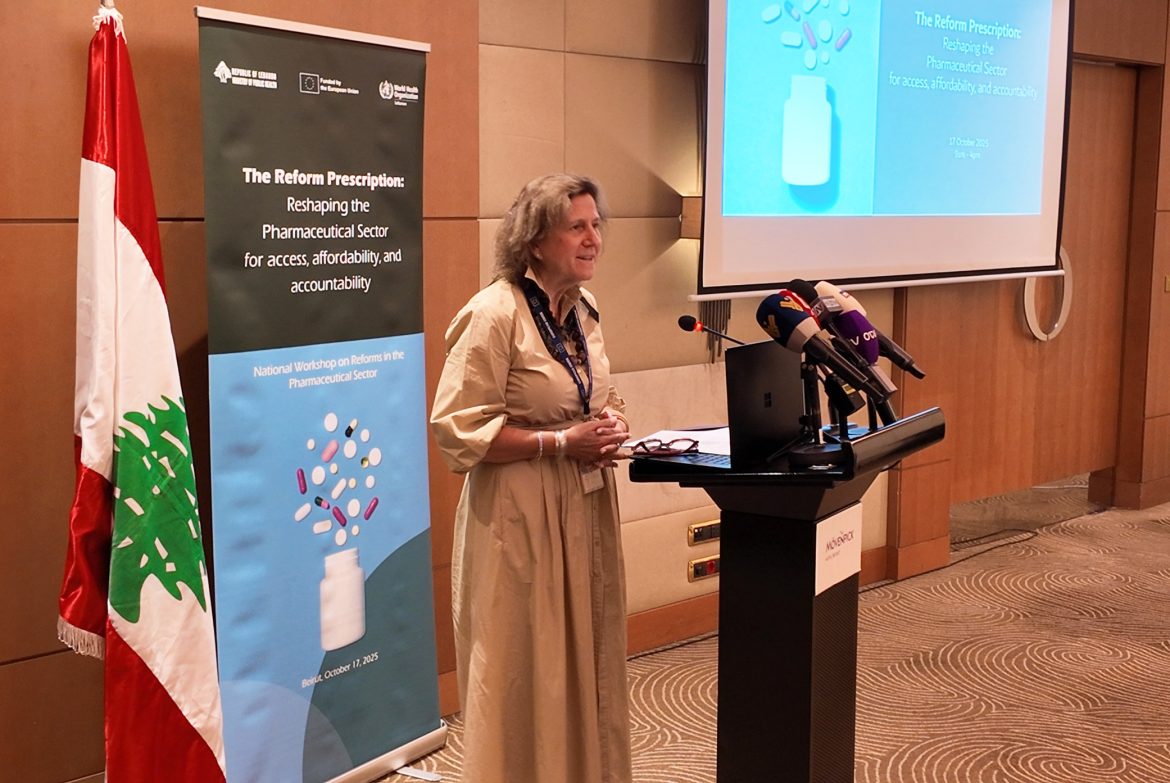Beirut, 17 October 2025 — The Ministry of Public Health, with the financial support of the European Union, and in collaboration with the World Health Organization (WHO), convened a National Workshop on Reforms in the Pharmaceutical Sector titled “The Reform Prescription: Reshaping the Pharmaceutical Sector for Access, Affordability, and Accountability.”
Held at the Mövenpick Hotel in Beirut, the workshop brought together senior officials, technical experts, and representatives from professional orders, academia, civil society, and the private sector to shape a comprehensive reform roadmap for Lebanon’s pharmaceutical system.
In his opening remarks, H.E. Dr. Rakan Nassereldine, Minister of Public Health, reaffirmed the government’s commitment to transparency and equitable access to quality medicines.
“Reform and Rescue” is the defining vision of the current government, and for the Ministry of Public Health, it is a daily mission. We are convinced that Lebanon will recover only through reform, deep and systemic reform. And that only through strengthening our institutions can we heal our health system, empower our people, and restore the vitality of our economy.”
He concludes, “In closing, allow me to speak not only as Minister but as a citizen who believes in this country’s capacity to reinvent itself. Lebanon’s story has never been a surrender, it is one of persistence and reinvention. With your collective expertise and commitment, we can turn this workshop into a turning point towards recovery and growth.”
Ms. Alessandra Viezzer, Head of Cooperation at the EU Delegation to Lebanon, emphasized the EU’s continued support to build a stronger, fairer, and more resilient health system Lebanon:
“Today’s workshop is an encouraging step forward. By focusing on pharmaceutical reform, we are tackling a vital issue. One that can truly improve access, lower costs, and increase trust in the system. Since 2015, the EU has contributed over €75 million to strengthen the national medication system. As a development partner, we always work towards one main goal: national system building”.
In his remarks, Dr. Dr. Yutaro Setoya, Deputy Representative of WHO Lebanon emphasized that pharmaceutical reform lies at the heart of public health security and equity:
“By investing in pharmaceutical governance, Lebanon is investing in its people, its credibility, and its future. The establishment of the Lebanese Drug Agency and the modernization of governance, digital systems, and manufacturing standards are vital milestones toward a stronger and more transparent health system,” he said.
He also highlighted the long-standing WHO–EU–MoPH partnership that has secured access to essential medicines for over one million beneficiaries and supported critical digital initiatives such as MediTrack, Lebanon’s national medicine traceability system.
The workshop builds on efforts to advance reforms in regulatory systems, good manufacturing practices (GMP), health technology assessment, pharmacovigilance, and digital innovation in Lebanon. In particular, the Ministry of Public Health, with the technical collaboration of WHO, is leading a major program funded by the European Union to strengthen GMP and prepare Lebanon for the Pharmaceutical Inspection Co-operation Scheme.
Throughout the day, participants engaged in four thematic working groups on governance, quality and safety, supply chain and digitization, and support to local pharmaceutical production. Each group identified priority actions to inform the Pharmaceutical Reform Roadmap, which will guide the implementation of policy and regulatory measures in alignment with the broader Health Sector Reform Framework. This initiative marks a key milestone in Lebanon’s efforts to modernize its pharmaceutical system and ensure access, affordability, and accountability for all

